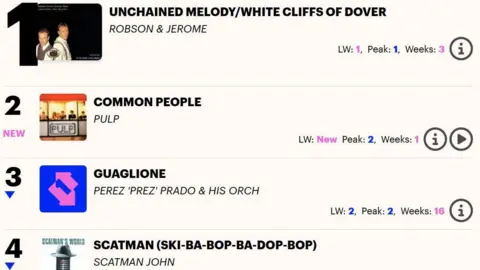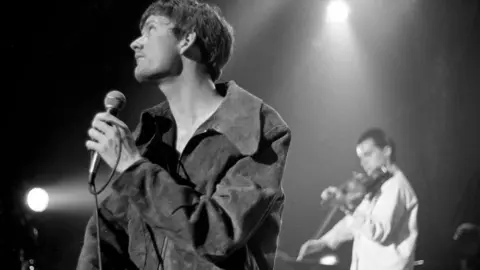ARTICLE AD BOX
Simon Thake
BBC News, Yorkshire
Reporting fromSheffield

 Getty Images
Getty Images
Jarvis Cocker said Common People was based on the changes he saw moving from Sheffield to London
Thirty years ago today Pulp let loose their biggest hit. In just five minutes and 51 seconds Common People shone a light on class, politics and Britain in the 90s.
Three decades on the song remains as popular as ever, but how did a riff Jarvis Cocker's bandmates initially dismissed as "a bit rubbish" become one of the defining records of the Britpop era?
Early 1995; John Major's Conservative government is faltering, Eric Cantona is serving an eight-month ban for kicking a supporter, rogue trader Nick Leeson has brought Britain's oldest bank to its knees and Britpop is booming.
At the same time in the Town House recording studio in west London, the members of Pulp were scratching their heads at what to do with their latest song.
"It didn't really go anywhere, it felt a bit one dimensional," drummer Nick Banks told the BBC ahead of the song's 30th anniversary.
The keyboard part at the centre of Common People had been written by frontman Cocker the previous year with little fanfare.
"It seemed kind of catchy, but I didn't think too much about it," the singer revealed in a 2004 BBC documentary.
"I didn't think 'wow, that's a masterpiece' I just thought it could come in handy for something."
Bass player Steve Mackey - who died in 2023 - was a little more scathing: "It sounded pretty rubbish."
Only keyboardist Candida Doyle saw its potential, remarking in the documentary how she thought it was "great straight away".
"It must have been the simplicity of it, you could just tell it was a really powerful song," she said.
'It built like a runaway train'
However, when it came to rehearsing the song Banks said the band kept naturally speeding up, building to a final crescendo when they actually wanted to maintain a consistent rhythm.
But, he said, when they managed to keep the tempo down "everyone was bored to tears" by the halfway point, and the track became "slow and ponderous".
Making it faster didn't work either, he said, so the band decided to embrace the change of speed and set a "timed framework" that gathered momentum as it went on.
"It was my inaccurate time keeping that created a happy accident," Banks said.
"It built like a runaway train, and that was the mystery secret of the song."

 Tom Jackson
Tom Jackson
Common People was recorded at the Town House studio in West London in 1995
But it is more than just the driving energy of Common People that has made it an enduring success.
The lyrics and narrative also captured people's imagination.
From the intrigue surrounding the mystery student who inspired the opening lines - "She came from Greece, she had a thirst for knowledge/She studied sculpture at St Martin's College" - to the acutely observational reflections on working-class life.
Speaking in 2004, Cocker, who grew up in the Intake area of Sheffield before going to study film at St Martin's in 1988, said: "It was [written] not that long after I had moved down to London and so the sensibility is definitely that of somebody moving from up north to down south.
"You just see more of society, there's more extremes in London. For a start you see people with money."
As to who was the muse of the piece, in 2015 the Athens Voice claimed they had identified her as Danae Stratou - the wife of the Greek finance minister, Yanis Varoufakis.
In an interview with BBC World News Mr Varoufakis said: "Well, I wouldn't have known her back then.
"But I do know that she was the only Greek student of sculpture at St Martin's College at that time. And, from personal experience, she is a very fascinating person."

 Getty Images
Getty Images
Manchester United maverick Eric Cantona appeared at an FA disciplinary hearing in 1995 for his kung-fu kick on a member of the crowd at a game
Despite the popularity of the song, Common People was beaten to number one by former Soldier Soldier actors Robson Green and Jerome Flynn and their rendition of Unchained Melody and White Cliffs of Dover.
Recalling the moment the band learned their fate, Banks said they had been booked to take part in a live BBC Radio One chart rundown in Birmingham's Centenary Square.
With the rain lashing down, the band sat waiting backstage as one by one the other acts left, until only they were left and just two names remained in contention.
"Robson and Jerome hadn't actually bothered to turn up, but we were announced number two," Banks said.
"We went out, Jarvis was wearing his usual quite stacked heels and promptly went arse over apex on the slippery flatbed lorry and ended up lying flat on his back miming along to Common People on the radio."
Pop historian Jonathan Rice said the song was among an "eminent list" of hit singles that never reached number one.
"Strawberry Fields by The Beatles never made the top," he said.
"Vienna by Ultravox was kept off number one by Shaddupyaface by Joe Dolce.
"[But] these are songs that stood the test of time and are much more memorable than the songs that beat them to number one."
As the author of The Guinness Book of British Hit Singles, Rice said Common People "defined a generation".
"It was a song that just summed up the atmosphere at the time felt by younger generation. It reflected the class barriers in such a witty and clever way."

 Offical Charts
Offical Charts
Robson and Jerome pipped Pulp to the number one spot - Scatman John took fourth
Prior to 1995, Pulp had failed to trouble the upper echelons of the charts, only reaching number 33 with their 1994 track Do You Remember The First Time?
So why did Common People catch on in a way that previous Pulp material had failed to?
Eric Clarke, a former Professor of Music at the University of Oxford, said it was in part the band's ability to reflect the mood of the country mixing "a genuine energetic, celebratory quality" with "anger and a sneering quality".
"Common People is the most brilliant single from the 1990s
"It was coming to the end of the Thatcher and Major period, people were sick to the back teeth of years of Tory government.
"There was a general upwelling of feeling that surely things could be different.
"It mixes thin, cheesy synth sounds with a really driving beat that seems to always be accelerating, the whole song is driving on to that incredible anthemic chorus at the end, which feels, to my ears, like an outpouring, a genuine release of frustration."
Listen: Sheffield's "unofficial national anthem" at 30
Nicola Dibben, now music professor at the University of Sheffield, was herself a student in the city in 1995.
"What's really striking and meaningful is how the song captures what it means to be poor," she said.
"Common People sends up class tourism. I love the anger and glee that Jarvis deals with through his acerbic witticisms.
"His confessional breathy lyrics, he's so close to the mic - you can hear the lip smacks - it draws you in to the story right from the start."

 Getty Images
Getty Images
Pulp, pictured here in 1991, are back on tour in 2025 with their new album More
Perhaps the moment that cemented Common People's place in history was the band's last-minute headline appearance at Glastonbury.
After Stone Roses guitarist John Squire broke his collar bone falling off a bike, the Sheffield band were drafted in to plug the hole.
What followed was arguably one of Glastonbury's most famous headline shows.
The moment was not lost on Cocker.
Addressing the enormous crowd, he said: "If you want something to happen enough then it will actually happen. I believe that. That's why we are stood on this stage today.
"If a lanky git like me can do it, then so can you."
Now, 30 years on, as the band prepare to tour again - their first since the death of bassist Mackey - Banks said he believed Common People was "still a song that gets you going".
"To me it still sounds fresh, vibrant and immediate and a worthwhile social commentary," he said,
Reflecting on the songs enduring success in 2004, Doyle said: "I remember at one point thinking I wish we could write a song that would be fantastic for ever and ever and ever - and then I thought 'oh, we have'."

 8 hours ago
2
8 hours ago
2








 English (US) ·
English (US) ·